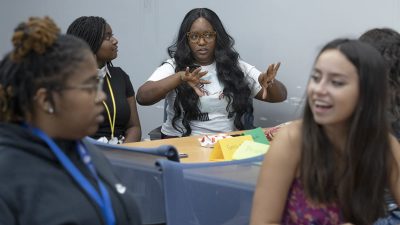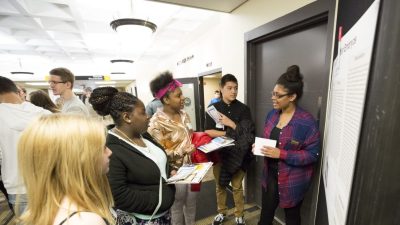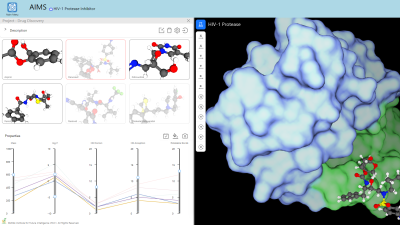Biology, Bioinformatics, & Chemistry Academy for Research Scholars (B2-CARS): A Partnership to Address Human Health Through Waste Water Remediation
Project Website(s)
-
Project Description
The Biology, Bioinformatics, & Chemistry Academy for Research Scholars (B2-CARS): A Partnership to Address Human Health Through Waste Water Remediation program is an innovative residential summer enrichment STEM program designed to stimulate and extend the interest of underrepresented middle school students and STEM teachers in the fields of biology, bioinformatics and chemistry. The purpose of the program is two-fold: 1) to encourage middle school students from underrepresented groups to prepare for further study and careers in STEM disciplines; and 2) to develop cohorts of teachers who are competent and comfortable with introducing students to the tools of bioinformatics and science inquiry in their classes. Our B2-CARS program introduces and reinforces scientific and mathematical concepts with enjoyable, hands-on experimentation combined with extensive use of technology, field trips as well as fosters discovery learning through small group real world research projects.
-
Abstract
Biology, Bioinformatics, & Chemistry Academy for Research Scholars (B2-CARS): A Partnership to Address Human Health Through Waste Water Remediation will provide 2 cohorts of underrepresented minorities with a 2-week residential STEM summer enrichment program and a cohort of teachers professional development in the area of Bioinformatics. B2-CARS will integrate hands-on discovery activities in biology, bioinformatics and chemistry with a real-world laboratory research project in human health through wastewater remediation. This program will directly impact 48 interested middle school
students from federally recognized under-represented groups and 4 middle school teachers in Delaware each year. The four middle school teachers will serve as B2-CARS ambassadors and return to their respective schools to integrate and implement bioinformatics tools and inquiry-based activities in their classrooms: impacting an approximate average of 100 students per year.The long-term goal of the project is to increase the number of underrepresented students entering college majoring in science, technology, engineering, and mathematics (STEM), thereby addressing the problem of under-representation of minorities in these fields. This research study will investigate the ability of a culturally responsive STEM residential summer program to increase participants knowledge in STEM, enable participants to develop critical thinking skills, positively influence participants to
attend college (both undergraduate and graduate school) and major in STEM. We hypothesize that the B2-CARS program will help participants develop 21st century skills as well as encourage and prepare participants to move forward and be successful in college majoring in STEM disciplines.The B2-CARS program will consist of 1 cohort of STEM teachers and underrepresented middle school students split
into two independent 2-week summer enrichment programs that will provide the young scholars with an exciting,
culturally responsive, college-like experience while conducting real-world research in wastewater remediation. The
specific objectives that will be used to guide our project and measure its success are:
1) To increase STEM knowledge, skills, and self-efficacy in groups of underrepresented minorities in middle
school.
2) To increase student participants’ interest in science through hands on problem solving of water
remediation, and foster scientific ways of thinking that involve risk-taking, openness, and seeking questions
as well as answers.
3) To introduce a group of STEM teachers to the computational tools of bioinformatics and increase their
comfort with exercises and activities that link computers, math, and biology.
4) To provide an opportunity for young scholars to interact with diverse scientists, teachers, career
professionals and college students who can serve as role models and dispel misconceptions about careers in
STEM.During the program, students will start the camp day with a Rise, Shine, and Read session. During the session, students will read about a range of current topics in STEM and identify/discuss the who, when, what and where. Then, students will engage in interdisciplinary inquiry-based exercises infusing Bioinformatics, Biology and Chemistry. The students will also spend hours each day on a real-world research project in groups of six. At the end of the program there will be a final symposium at which each group will present the results of their research. The students will also interact daily with invited speakers who are faculty, graduate students, scientists, or IT workers who can act as role models. Field trips are also included and designed to expose participants to the use of science and mathematics in real world situations.
The B2-CARS program is innovative in the way it combines inquiry-based laboratory explorations, on-site visits to key facilities and real world research projects in a residential summer enrichment program for underrepresented middle school students. The program targets some of the key factors associated with minority persistence in STEM fields. As a Historically-Black University with an approximately 80% minority enrollment and a 120-year history of educating students of all races, Delaware State University has deep ties to underrepresented communities in the state and region which will aid in recruiting participants. In addition, the high level of diversity among faculty, undergraduate and graduate students on the campus ensures that program staff and leadership possess the cultural competency to provide a supportive environment.
-
Dissemination Strategies
B2-CARS at Delaware State University | DSU College of Agriculture, Science & Technology (desu.edu)
Project Audience
Federally recognized underrepresented minority middle school students and middle school STEM teachers in Delaware.
Subjects Addressed
Human health, microbiology, chemistry, bioinformatics, reading and math.
Associated SEPA Project(s)
-
Biology, Bioinformatics, & Chemistry Academy for Research Scholars (B2-CARS): A Partnership to Address Human Health Through Waste Water Remediation
R25GM137366-01 : 09/11/2020 - 07/31/2025






